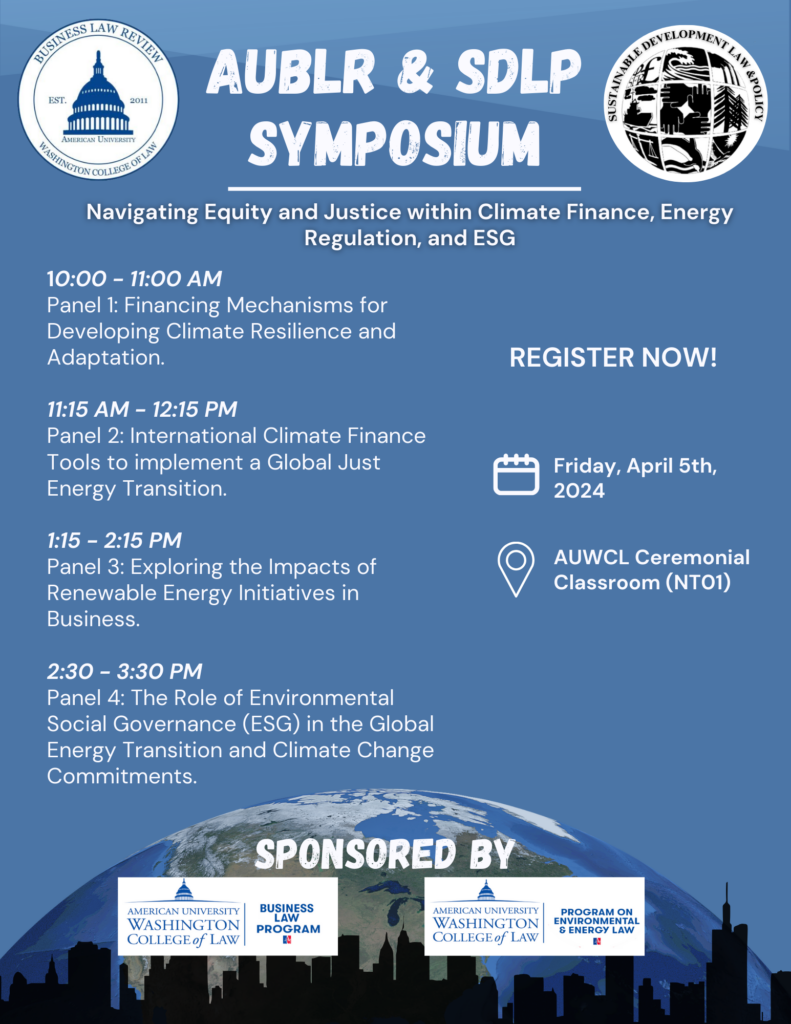AU Business Law Review & Sustainable Development Law and Policy Brief Spring 2024 Symposium
“Navigating Equity and Justice in Climate Finance, Energy Regulation, and ESG”
Sponsored by the Program on Environmental & Energy Law (PEEL) and the Business Law Program.
Friday, April 05, 2024 | 9:40 a.m. – 4:30 p.m. | Warren, NT01 & on Zoom
Agenda:
9:20 – 9:40 AM: Registration and Breakfast
9:40 – 10:00 AM: Welcoming Remarks
10:00 – 11:00 AM: Financing Mechanisms for Developing Climate Resilience and Adaptation.
11:00 – 11:15 AM: Break
11:15 – 12:15 PM: International Climate Finance Tools to Implement a Global Just Energy Transition.
12:15 – 1:15 PM: Lunch
1:15 – 2:15 PM: Exploring the Impacts of Renewable Energy Initiatives in Business.
2:15 – 2:30 PM: Break
2:30 – 3:30 PM: The Role of Environmental Social Governance (ESG) in the Global Energy Transition and Climate Change Commitments.
3:30 – 4:30 PM: Networking event at WCL
Information:
This is an interdisciplinary symposium aimed at exploring the intersection of business, environmental, and energy law. This symposium will explore a wide range of current issues in the climate finance, energy regulation, and environmental social governance spheres. This symposium will provide crucial conversations about the role of marginalized communities and justice in sustainable development and finance mechanisms for climate change. The symposium is jointly organized by the Sustainable Development Law and Policy Brief & AU Business Law Review.
10:00 – 11:00 AM
Panel 1: Financing Mechanisms for Developing Climate Resilience and Adaptation.
The purpose of this panel is to hear from local government leaders on how cities develop equitable, comprehensive, and feasible climate action plans to address key priorities such as climate adaptation and resilience. It will also focus on the challenges facing the investment and implementation of these projects. The throughline of the session will be considering strategies at every stage of the project to ensure impacted and marginalized communities are not left behind in the planning and response to climate change. The discussion will feature an exploration of the Justice40 Initiative and how that will affect these climate adaptation strategies and the impact it will have on business and its role in the climate crisis.
11:15 – 12:15 PM
Panel 2: International Climate Finance Tools to Implement a Global Just Energy Transition.
This panel will provide an overview of the connection between the financial sector and environmental activism. This session will cover National obligations under the Paris Agreements and the mechanisms at play to meet those obligations. It will also cover new and innovative mechanisms to effectuate climate action such as litigation as a means of climate finance including the loss and damage fund. This session will include discussions of the intersection of equity and fairness in climate financing on an international level and the roles of the North and South in achieving a Just Energy Transition.
1:15 – 2:15 PM
Panel 3: Exploring the Impacts of Renewable Energy Initiatives in Business
This panel is meant to explore the transition to renewable energy in the business sector including specific initiatives that are helping businesses make that transition. In a changing climate landscape, businesses play a large role in shaping sustainable business practices and driving the global energy transition.This panel will explore regulatory frameworks impacting businesses. This panel will include the conversation surrounding a fair and equitable transition, including voices of marginalized communities.
2:30 – 3:30 PM
Panel 4: The Role of Environmental Social Governance (ESG) in the Global Energy Transition and Climate Change Commitments.
This panel will go through the rise of ESG in recent years and how those initiatives in business contribute to climate change goals. The discussion will go into the regulatory landscape, industry standards, and investor expectations shaping corporate ESG performance and disclosure requirements. This panel will highlight innovative approaches and best practices for integrating ESG considerations into corporate strategy, risk management, and stakeholder engagement. The session aims to promote collaborative solutions for advancing goals of the global energy transition and addressing the challenges of climate change in the business sector. This panel will also highlight the increase of importance in DEI initiatives in governance as well as sustainable supply chain operations with human rights considerations.



